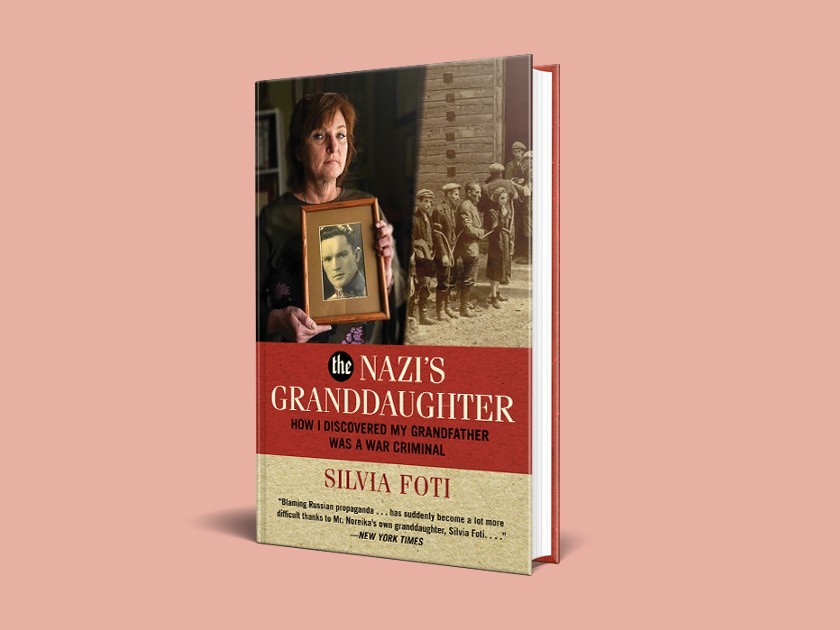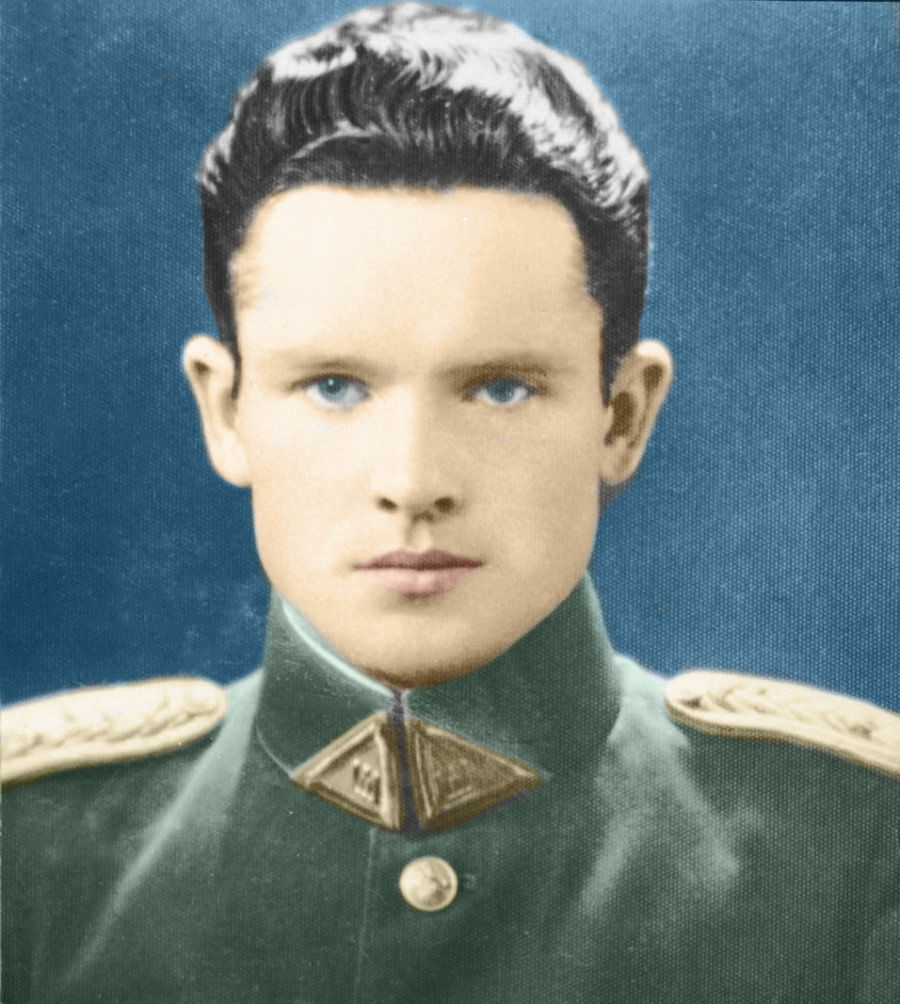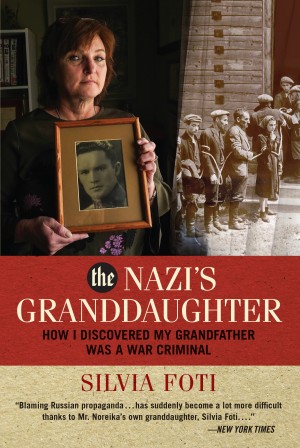
Cover of A Nazi’s Granddaughter: How I Discovered My Grandfather Was a War Criminal from Regnery History
After the release of my memoir, A Nazi’s Granddaughter: How I Discovered My Grandfather Was a War Criminal, I have been repeatedly accused of “airing my family’s dirty laundry” by Lithuanians who point out the obvious: I wasn’t alive during World War II and the Nazi occupation, so how could I possibly understand the difficult choices some Lithuanians, like my grandfather, had to make?
I knew why they had this reaction. As I researched my grandfather’s life during the Nazi occupation in Lithuania, I was also uncovering an entire nation’s complicity in murder that still has not been confronted. Lithuania has the distinction of having murdered ninety-six percent of its Jewish population during the Holocaust, the highest percentage in all of Europe.
If it weren’t for my story, I believe Lithuania could have gotten away with it — the tenth stage of genocide, or denial that it ever happened.
______
I grew up proud to be the granddaughter of a Lithuanian war hero who had fought against Communists. My grandfather Jonas Noreika, known as General Storm, is the namesake for a school in Sukonai and a street in Kaunas. When my mother, on her deathbed, asked me to write a book about him, I enthusiastically agreed. As I dug deeper, however, I discovered facts about him that left me horrified. Jonas Noreika had been a Holocaust perpetrator involved in murdering at least 8,000 Jews.
I had the sensation of falling through a trapdoor. It just can’t be true, I kept thinking. Not my wonderful grandfather! I conferred with family members, and they said what I’d heard was just Communist propaganda. That is the belief I clung to for years.
But as a journalist, I ultimately couldn’t just ignore the accusation. I decided to persevere with my research in the hope of exonerating my grandfather.
Once I started looking for evidence, I kept finding signs that he had been involved in murdering Jews. He signed nearly one hundred documents concerning the Holocaust when he was chair of the Šiauliai region from August 1941 to March 1943. The most damaging one ordered all Jews and half-Jews in Šiauliai to be sent to a ghetto in Žagarė. About 2,000 Jews were slaughtered on Yom Kippur. This document turned my life upside down. I didn’t know who I was anymore. Certainly not a proud Lithuanian. I felt shame, embarrassment, and a sense of betrayal. This was the legacy my grandfather had left me?
Eventually, I dug myself out of my depression and embraced anger with a vengeance. I vowed to get to the bottom of the story, no matter the cost.
In 2018, when I thought my work was finished, I created a website. Within days, a researcher from Lithuania contacted me, telling me he was working for Grant Gochin, a man who had launched a lawsuit against the Lithuanian Genocide Research and Resistance Centre because of its denial of my grandfather’s crimes.
I would like to see Lithuania become the first Eastern European country to fully admit its role in the Holocaust.
Once I connected with Gochin, and once I understood what the Genocide Centre was doing by ignoring the paper trail of evidence against my grandfather and his role in the Holocaust — and still declaring him a hero — I realized this inversion of truth extended far beyond my family. It involved the government of Lithuania.
I became terrified, truly terrified. How was I going to stand up to the government machine? I braced myself.

Jonas Noreika, Image courtesy of the author.
Then my story began to receive attention from the media. Because of this response, I am beginning to hope there might be a change in Lithuania’s attitude. The country is a new democracy and it cares deeply about the Western world’s perception of it.
I hope my book creates a path to quelling our intertwined internal pain and eventually to mutual understanding. This book is my confession.
We still have a long road ahead. But I would like to see Lithuania become the first Eastern European country to fully admit its role in the Holocaust, to take the lead in accepting responsibility for what happened during the Holocaust and not just shift all the blame onto the German Nazis. While it’s true the Holocaust would not have started without the Nazis, it’s also true it would not have been as devastating if Lithuanians themselves didn’t join in so willingly.
______
Since my story became public, I have met several rabbis, many of them Litvaks who lost relatives in the Holocaust. One helped me with the guilt I have been carrying because of my grandfather’s legacy. He recited two passages in the Torah about children repenting for the sins of their fathers, and told me that those who are in willful denial over the role their grandparents played in the Holocaust may be punished up to the fourth generation. But those who accept the horrible reality will break the curse. And then he blessed me.
I wish I could say all the guilt magically disappeared. But I can say that I will continue to be sorry for the sins of my grandfather until the day I die, because once I learned the truth, I feel obligated to bear witness.
My generation did not perpetrate these crimes. But it is our responsibility to relate them with honesty. It is our only path to internalizing the lessons of the past and to creating a future in which our children will not repeat the crimes of our ancestors.
Lithuania’s Holocaust denial is a continuation of my grandfather’s crimes, and continued silence by descendants of perpetrators is the death knell of truth in an environment where a national government is intent on rewriting history. Once Lithuanians truly understand how horrifically they acted against their Jewish neighbors, there will be a chance for reconciliation. But that reconciliation must be based on reality, and not on deception.
A former journalist of twenty years in Chicago and now a high school literature teacher at Proviso Mathematics and Science Academy in Forest Park, Illinois, Silvia Foti is the author of The Nazi’s Granddaughter: How I Learned My Grandfather was a War Criminal, published in March 2021 by Regnery History. The book has been translated into Spanish, and is currently being translated into Lithuanian, Polish, and Hungarian. The paperback edition is coming in June 2022 with a new title: Storm in the Land of Rain: A Mother’s Dying Wish Becomes A Daughter’s Nightmare.
